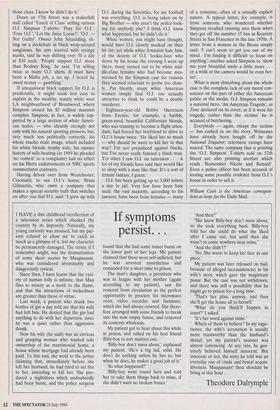If symptoms persist. . .
I HAVE a dim childhood recollection of a television series which shocked the country by its depravity. Naturally, my young curiosity was aroused, but my par- ents refused to allow me to catch so much as a glimpse of it, lest my character be permanently damaged. The series, if I remember aright, was the dramatisation of some short stories by Maupassant, who was considered abominably and dangerously cynical.
Since then, I have learnt that the vari- ety of human folly is infinite, that Man flies to misery as a moth to the flame, and that the attractions of wickedness are greater than those of virtue.
Last week, a patient who drank two bottles of gin a day told me that his wife had left him. He denied that the gin had anything to do with her departure, since he was a quiet rather than aggressive drunk.
Now his wife (he said) was an envious and grasping woman who wanted sole ownership of the matrimonial home, a house whose mortgage had already been paid. To this end, she went to the police claiming that, immediately before she left her husband, he had tried to set fire to her, intending to kill her. She pro- duced a nightdress which undoubtedly had been burnt, and the police surgeon found that she had some minor burns on the lower part of her legs. My patient claimed that these were self-inflicted, but he was arrested nonetheless and remanded for a short time to prison.
The man's daughter, a prostitute who was in league with her mother (again according to my patient), saw his removal from circulation as the perfect opportunity to procure his microwave oven, video recorder and furniture, which she had always coveted. She there- fore arranged with some friends to break into the now empty house, and removed its contents wholesale.
My patient got to hear about this while in prison, and called on his best friend Billy-boy to sort matters out.
'Billy-boy don't mess about,' explained my patient. 'He's a big lad, solid. He don't do nothing unless he has to, but when he does, he makes a good job of it.'
`So what happened?'
'Billy-boy went round hers and told her to take them things back to mine, if she didn't want no broken bones.' 'And then?'
'She knew Billy-boy don't mess about, so she took everything back. Billy-boy told her she could do what she liked after I came out, but until then she wasn't to come nowhere near mine.'
'And she didn't?'
'No. She wants to keep her face in one piece.'
My patient was later released on bail, because of alleged inconsistencies in his wife's story, which gave the magistrate pause. But the case was not withdrawn, and there was still a possibility that he might go to prison for a long time.
'That's her plan, anyway, and then she'll get the house all to herself.'
'What do you think'll happen in court?' I asked.
'It's her word against mine.'
Which of them to believe? In my expe- rience, the wife's accusation is usually more trustworthy than the husband's denial: yet my patient's manner was almost convincing. At any rate, he gen- uinely believed himself innocent. But innocent or not, the story he told was an everyday one of crude and brutal acquis- itiveness. Maupassanti thou shouldst be living at this hour...
Theodore Dalrymple


















































 Previous page
Previous page